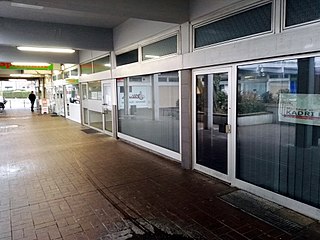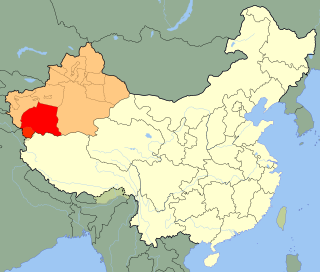
The Munich massacre was a terrorist attack carried out during the 1972 Summer Olympics in Munich, West Germany, by eight members of the Palestinian militant organization Black September, who infiltrated the Olympic Village, killed two members of the Israeli Olympic team, and took nine others hostage. Black September called the operation "Iqrit and Biram", after two Palestinian Christian villages whose inhabitants were expelled by the Israel Defense Forces (IDF) during the 1948 Arab–Israeli War. The Black September commander was Luttif Afif, who was also their negotiator. West German neo-Nazis gave the group logistical assistance.
On 29 May 2004, a Saturday, four men armed with guns and bombs attacked two oil industry installations and a residential compound, in Al-Khobar, Saudi Arabia—the hub of the Saudi oil industry. Over approximately 25 hours, the gunmen, describing themselves as members of "The Jerusalem Squadron" or "Jerusalem Brigade", killed 22 and injured 25, mainly third country national personnel working in Khobar.

Ennepetal is a town in the district of Ennepe-Ruhr-Kreis, in North Rhine-Westphalia, Germany. It was created in 1949 out of the former municipalities Milspe and Voerde. It was named after the river Ennepe, which flows through the municipality.

Hostage is a 2005 American action thriller film directed by Florent-Emilio Siri. The film was based on the 2001 novel of the same name by Robert Crais, and was adapted for the screen by Doug Richardson. The film stars Bruce Willis, who co-produced the film, as the police chief who takes place as the negotiator when the family of a wealthy accountant is held hostage by three teenagers.
Members of the Iraqi insurgency began taking foreign hostages in Iraq beginning in April 2004. Since then, in a dramatic instance of Islamist kidnapping they have taken captive more than 200 foreigners and thousands of Iraqis; among them, dozens of hostages were killed and others rescued or freed. In 2004, executions of captives were often filmed, and many were beheaded. However, the number of the recorded killings decreased significantly. Many hostages remain missing with no clue as to their whereabouts. The United States Department of State Hostage Working Group was organized by the U.S. Embassy, Baghdad, in the summer of 2004 to monitor foreign hostages in Iraq.
The Dos Palmas kidnappings was a hostage crisis in southern Philippines that began with the seizing of twenty hostages from the affluent Dos Palmas Resort on a private island in Honda Bay, Palawan, by members of Abu Sayyaf on May 27, 2001, and resulted in the deaths of at least five of the original hostages. Three of these hostages were American citizens, Guillermo Sobero, and a married missionary couple, Gracia and Martin Burnham. At least 22 Filipino soldiers were killed in attempts to apprehend the captors and free the hostages in the 12 months following the initial hostage taking. An unknown number of captors were killed by government forces.
Said Al Nasr was a Syrian Palestinian known for carrying out the 28 July 1980 Antwerp summer camp attack, in which he attacked a group of 40 Jewish children waiting with their families for a bus to take them to summer camp with hand grenades. One boy was killed, and eight others were seriously wounded.

The Beslan school hostage crisis began when armed Chechen terrorists took more than 1200 school children and adults hostage on 1 September 2004, at School Number One (SNO) in the Russian town of Beslan in North Ossetia.
Six western tourists and their two guides were kidnapped in the Liddarwat area of Pahalgam in the Anantnag district of Jammu and Kashmir, India on 4 July 1995 by forty militants from the Kashmiri Islamist militant organisation Harkat-ul-Ansar, under the pseudonym of Al-Faran, in order to secure the release of Harkat leader Masood Azhar and other militants.
Events from the year 2007 in Afghanistan.

The Gladbeck hostage crisis or Gladbeck hostage drama was a bank robbery and hostage-taking that took place in West Germany from 16 to 18 August 1988. Two men with prior criminal records – Hans-Jürgen Rösner and Dieter Degowski – robbed a branch of the Deutsche Bank in Gladbeck, North Rhine-Westphalia, taking two employees as hostages. During their flight, they were joined by Rösner's girlfriend Marion Löblich, with whom they hijacked a public transport bus in Bremen. With twenty-seven hostages aboard, they drove towards the Netherlands, where all but two hostages were released, and the bus was exchanged for a getaway car. The hostage-taking was finally ended when the police rammed the getaway car on the A3 motorway near Bad Honnef, North Rhine-Westphalia.
The Geeta and Sanjay Chopra kidnapping case was a kidnapping and murder crime in New Delhi in 1978. It involved the kidnapping and subsequent murder of siblings Geeta and Sanjay by Kuljeet Singh and Jasbir Singh. Although the children were kidnapped for ransom, they were killed after the kidnappers learned that their father was a naval officer, in the assumption that he was not wealthy. Both men initially admitted to raping Geeta before her murder. They later retracted their statements and forensic evidence could not confirm the rape. The two kidnappers were convicted and sentenced to death. The execution was carried out in 1982. Crime Patrol Dial 100 aired two episodes on Sony TV based on the story, 723 and 724 on Feb 28, 2018 and Mar 1, 2018. The case was also shown on the TV series Bhanwar, which was based on real-life court cases.
Warren Weinstein was an American contractor, and director in Pakistan for J.E. Austin Associates, a firm which increases business competitiveness and growth in developing economies. He was kidnapped by eight al-Qaeda members on August 13, 2011, in Lahore, Pakistan. He was killed in a January 2015 US drone strike on the Afghanistan-Pakistan border, as announced by U.S. President Barack Obama at a White House press conference on April 23, 2015.

The Pishan hostage crisis occurred on the night of December 28, 2011, in Koxtag, Pishan/Guma County, Hotan Prefecture, Xinjiang Uygur Autonomous Region, China. A group of 15 ethnic Uyghur youths kidnapped two goat shepherds for directions near the Indian and Pakistan borders. They were soon confronted by a group of five Pishan policemen, who tried to negotiate for the shepherds' release. This led to a shootout in which a police officer and 7 hostage-takers were killed. Another police officer was injured, and 4 suspects were taken into custody. Both of the hostages were rescued by police.

On July 15, 1976, in Chowchilla, California, three armed men hijacked a school bus. They abducted the driver and 26 children, ages 5 to 14, and imprisoned them in a truck trailer buried in a quarry in Livermore, California. The bus driver and children managed to escape before the kidnappers could issue their ransom demands. All of the victims survived but many suffered from post-traumatic stress disorder.

The In Amenas hostage crisis began on 16 January 2013, when al-Qaeda-linked terrorists affiliated with a brigade led by Mokhtar Belmokhtar took expat hostages at the Tigantourine gas facility near In Amenas, Algeria. One of Belmokhtar's senior lieutenants, Abdul al Nigeri, led the attack and was among the terrorists killed. After four days, the Algerian special forces raided the site, in an effort to free the hostages.

On January 29, 2013, a hostage crisis, lasting almost seven days, began in the Wiregrass Region near U.S. Highway 231 in Midland City, Alabama. Jimmy Lee Dykes, a 65-year-old Vietnam War-era veteran, boarded a Dale County school bus, killed the driver, and took a five-year-old boy hostage. On the afternoon of February 4, law enforcement agents entered the bunker, killed Dykes, and rescued the child.
The 2000 Sipadan kidnappings was a hostage crisis in Sabah, Malaysia, and the southern Philippines that began with the seizing of twenty-one hostages from the dive resort island of Sipadan at approximately 6:15 p.m. on 23 April 2000, by up to six Abu Sayyaf (ASG) bandits. Taken hostage were 10 tourists from Europe and the Middle East and 11 Malaysian resort workers, 19 non-Filipino nationals in total. The hostages were taken to an Abu Sayyaf base in Jolo, Sulu.
On 20 February 1994 three armed militants from Afghanistan took control of a school bus near the city of Peshawar in the North-West Frontier Province of Pakistan, close to the Afghan border. Seven teachers and about seventy children in the bus were taken hostage. The bus was driven to the Embassy of Afghanistan in Islamabad, where fifty-seven or sixty-one of the hostages were released. The hijackers made demands for food relief to be sent to Kabul, for a ransom, and for safe conduct and a helicopter to take them to Afghanistan.

On 31 May 2016, the Taliban set up a fake military checkpoint along the Kunduz–Takhar Highway, near Arzaq Angor Bagh in the Kunduz Province of Afghanistan, and deployed approximately 250 militants there after disguising them as Afghan government officials. They subsequently kidnapped between 220 and 260 civilians coming through the checkpoint and held them as hostages, prompting the assembly of a rescue effort by the Afghan Armed Forces. By 8 June, at least 12 abductees were executed and more Taliban attacks followed throughout other parts of the country. A total of 33 people were killed in the ensuing hostage crisis. The exact death toll is unknown, but it is believed that most of the hostages were released or rescued.








